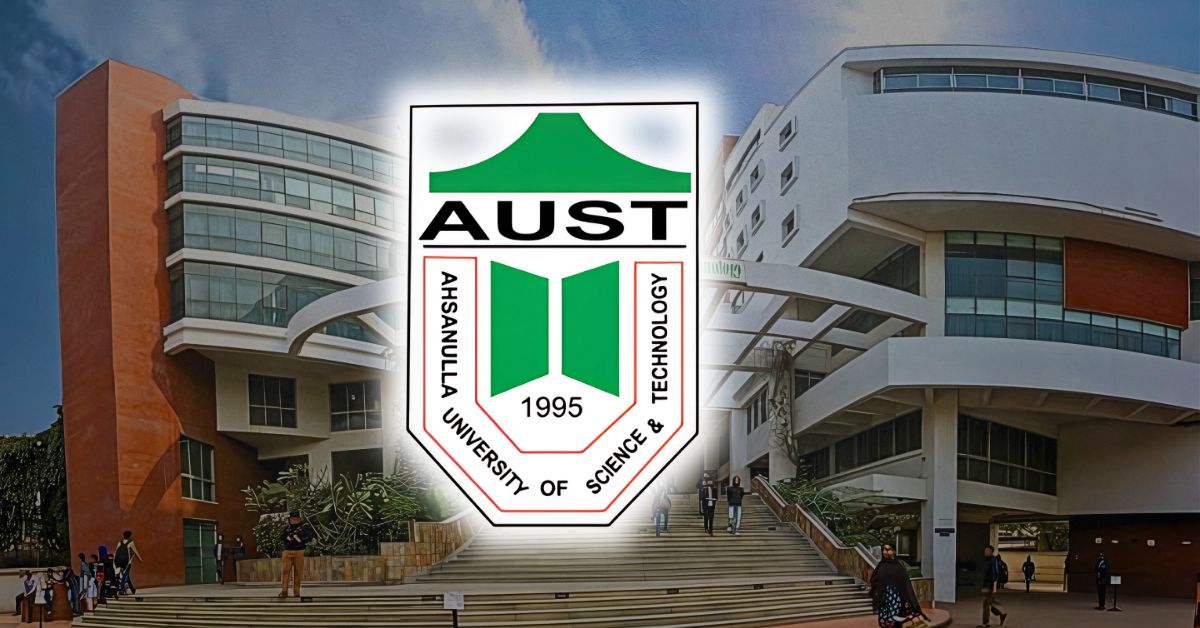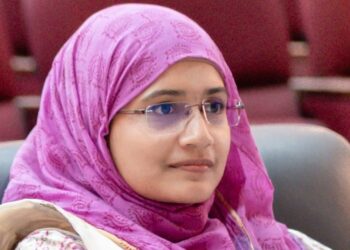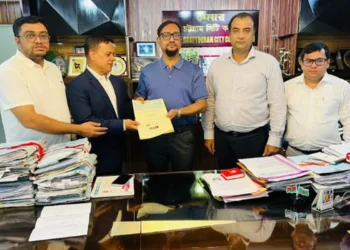Introduction
Ahsanullah University of Science and Technology (AUST), one of the leading engineering universities at the core of Dhaka, has been recognized for its academic excellence and innovation since its establishment in 1995. Founded under the visionary guidance of the Dhaka Ahsania Mission, AUST has continuously upheld a mission to foster ethical, skilled, and globally aware graduates who can meet the evolving demands of the modern world.
With a firm emphasis on science, technology, engineering, architecture, and business education, the university has cultivated a dynamic academic environment that harmonizes rigorous theoretical instruction with practical applications, interdisciplinary research, and vibrant co-curricular engagement. Over the years, AUST has expanded its academic portfolio, enhanced its infrastructure, and reinforced its commitment to sustainable development and societal impact.
A Journey of Vision and Enlargement: History and Background
AUST holds the distinction of being the first private engineering university in Bangladesh. Its permanent campus, located in Dhaka’s Tejgaon Industrial Area. Established in 1995 by the Dhaka Ahsania Mission, Ahsanullah University of Science and Technology (AUST) was founded to meet Bangladesh’s growing demand for quality higher education in science and technology. The Dhaka Ahsania Mission, a non-profit organization founded in 1958 by educationist Khan Bahadur Ahsanullah, aimed to promote education and social welfare. As of now, the current Vice-Chancellor of AUST is Prof. Dr. Md. Fazli Ilahi and Pro Vice-Chancellor is Prof. Dr. Kazi Shariful Alam.
Academic Programs and Departments
Ahsanullah University of Science and Technology (AUST) offers a diverse range of academic programs designed to prepare students for the demands of a competitive and rapidly changing global environment. The university’s curriculum emphasizes a blend of theoretical knowledge and practical application across science, technology, and business disciplines.
AUST is organized into several faculties, each offering specialized programs:
Faculty of Engineering
- Department of Civil Engineering (CE)
- Department of Electrical and Electronic Engineering (EEE)
- Department of Mechanical and Production Engineering (MPE
- Department of Computer Science and Engineering (CSE)
- Department of Textile Engineering (TE)
Faculty of Architecture and Planning
- Department of Architecture (Arch)
Faculty of Business and Social Sciences
- School of Business
Accreditation and International Recognition
All undergraduate engineering programs at AUST are accredited by the Board of Accreditation for Engineering and Technical Education (BAETE) under the Institution of Engineers, Bangladesh (IEB), which is a signatory of the Washington Accord. This global recognition ensures that AUST engineering graduates meet international educational standards, facilitating career and academic opportunities abroad. The university has also signed MoUs with international institutions, promoting research collaboration, faculty exchange, and joint academic ventures, thereby strengthening its global footprint.
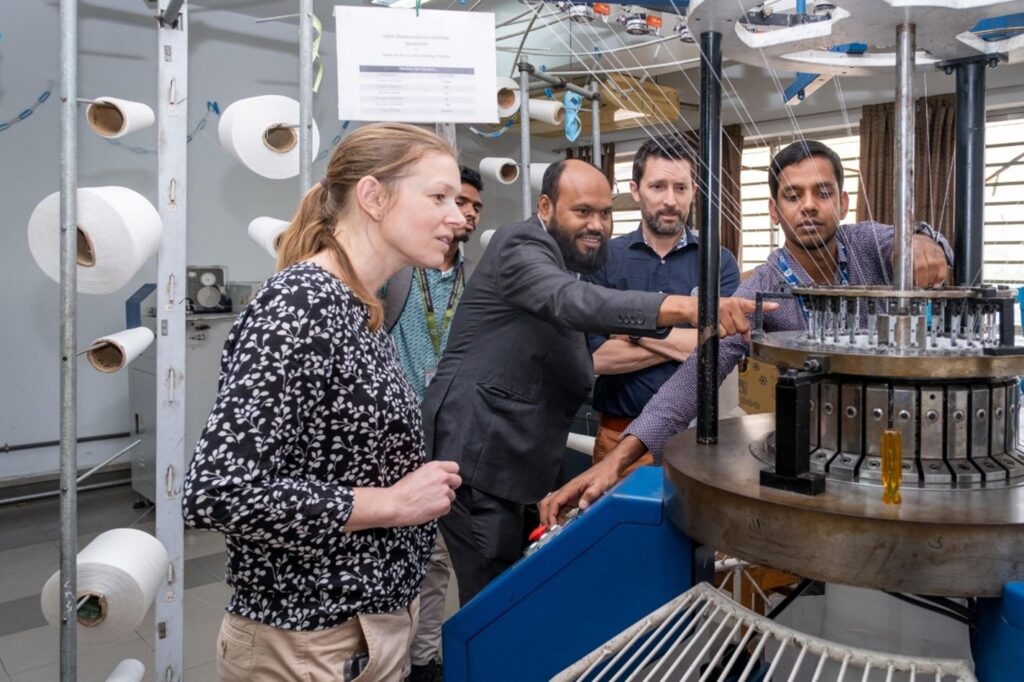
Understanding the Academic Landscape: Nomenclature and Grading
Ahsanullah University of Science and Technology (AUST) follows a structured academic system designed to facilitate comprehensive learning and ensure that students are evaluated fairly and rigorously. The university operates on a semester-based system, with two primary semesters: Spring and Fall.
The university has an advanced system of grading to evaluate students’ performance for all the programs into which they are enrolled. The system is letter-grading, where letters correspond to bands of numerically obtained marks on tests. The typical letter grades are-
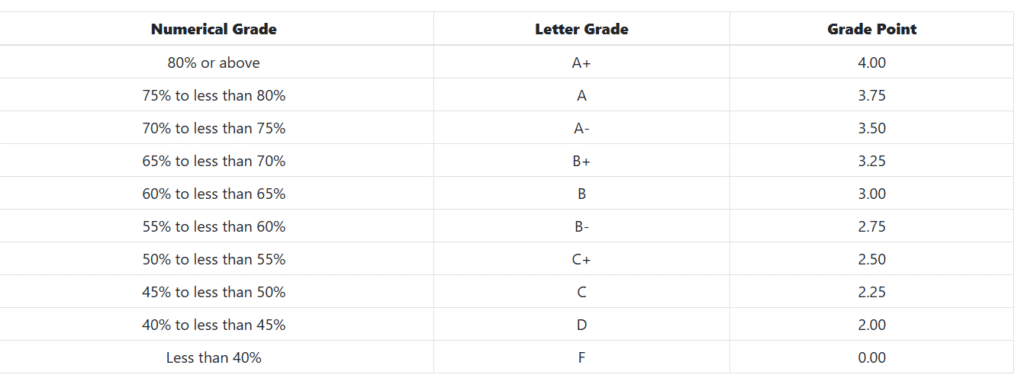
The level of student learning is usually established by an integration of various factors, including:
Assignments: Regular individual or group work designed to reinforce learning and assess understanding of course material.
Quizzes: Short, periodic assessments to measure immediate comprehension of key concepts.
Final Examinations: Extensive final exams held at the end of the semester, covering the entire syllabus.
Practical Work in Laboratories: Laboratory experiments and result documentation are key to developing technical expertise.
Project Work and Presentations: Practical assignments where students apply theoretical knowledge, enhancing both technical and communication skills.
Class Participation: Active attendance and involvement in class discussions and activities, which contribute to the final grade.
Each course at AUST has different weightings for these evaluation elements. For instance, a more practical course might place heavier emphasis on project work and lab sessions, while theory-based courses might focus on exams and assignments.
Read More: Bangladesh-NASA Aligned: Young Visionaries See Space as the New Frontier for Innovation
Campus Resources and Technological Advancements
The university emphasizes the importance of providing its students and faculty with the necessary infrastructure and support systems to excel both in academics and extracurricular activities. Below, we explore the key elements of AUST’s campus and facilities, which play an essential role in the university’s mission to shape the leaders of tomorrow.
Academic Infrastructure:
AUST’s campus is designed to offer an enriching educational experience, with advanced academic infrastructure that supports the university’s diverse range of programs. The central academic complex features spacious lecture theaters and classrooms, all equipped with cutting-edge audio-visual aids, such as projectors and sound systems, that foster an interactive and dynamic learning environment.

Specialized laboratories across disciplines play a crucial role in bridging the gap between theoretical knowledge and practical application. These include:
Thermodynamics Lab: A lab dedicated to studying the principles of thermodynamics, heat transfer, and energy systems. Students use this lab to experiment with engines, heat exchangers, and refrigeration systems.
Fluid Mechanics Lab: This lab provides students with the opportunity to understand fluid behavior and conduct experiments related to fluid dynamics, including pipe flow, open channel flow, and fluid properties.
Artificial Intelligence and Machine Learning Lab: Students in this lab gain hands-on experience with AI algorithms and machine learning models, utilizing tools such as Python, TensorFlow, and MATLAB to develop AI-based applications
Material Testing Lab: Students test various construction materials, such as concrete, steel, and asphalt, to understand their strength, durability, and other properties essential for civil engineering projects.
Design Studio: This is a creative space where architecture students work on their design projects, develop models, and engage in architectural visualization using advanced computer-aided design (CAD) software.
Automation Systems Lab: This lab focuses on the automation of industrial systems, allowing students to work on programmable logic controllers (PLCs), sensors, and actuators used in manufacturing and industrial automation processes.
The integration of these academic resources ensures that students at AUST are not only taught theoretical concepts but are also equipped to apply their learning in real-world settings.
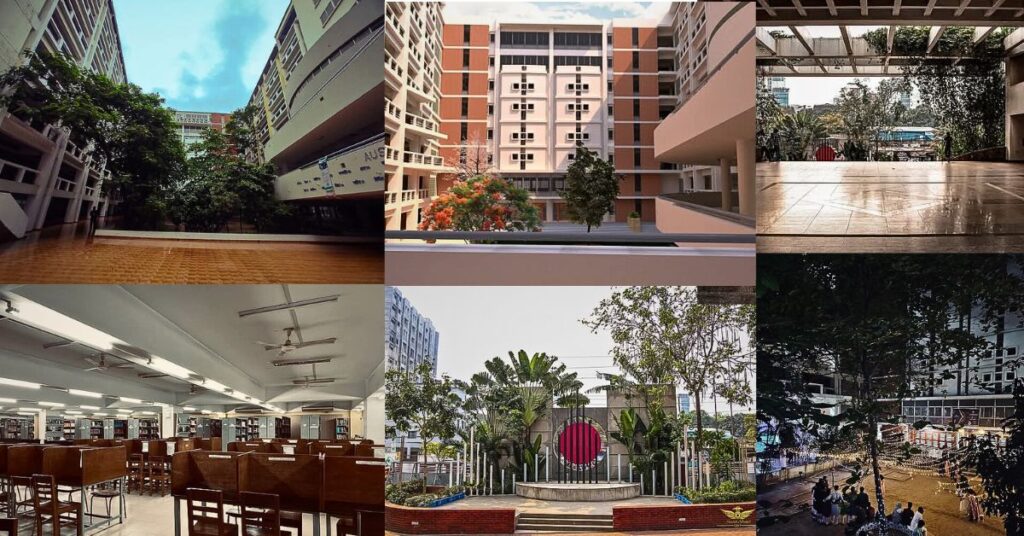
Library Facilities:
AUST’s library is a cornerstone of its academic environment, offering a conducive space for both learning and research. The library is designed to provide students with a quiet, inviting atmosphere, equipped with ample reading spaces, carrels for individual study, and areas for group discussions. It houses a vast collection of physical books, periodicals, and journals that complement the university’s academic programs.Additionally, the library offers a range of electronic resources such as e-books, electronic databases, and online journals, which provide access to a wealth of academic and research materials. These resources enhance the university’s ability to support both students and faculty in their research endeavors.
Support Facilities and Services:
To enhance the overall student experience, the university provides a range of support services. The campus includes a cafeteria offering nutritious and affordable meals, along with student lounges and interaction areas that encourage relaxation and peer engagement. Counseling services are available to support mental health and provide career guidance for students planning their professional paths. Additionally, AUST ensures access to basic healthcare through its on-campus first-aid facilities. Transportation services are provided to make commuting easier and safer for students.
Recreational and Extracurricular Space:
In an understanding of the requirement of an overall educational experience, AUST always offers space for extracurricular activities and sports. These range from sport grounds or courts for football, cricket, basketball, and volley-ball, to name only a few, to indoor game centers. Auditoria and seminars are made available for academic use, cultural activities, as well as student body meeting space. Student club and organization space may also be provided, adding vibrancy to campus life.
AUST is committed to keeping its campus and facilities up to date with the growing needs of its academic community. The university is constantly working on upgrading its infrastructure to meet the evolving demands of education and research. This commitment to development ensures that AUST remains a conducive and vibrant venue for learning, growth, and innovation.
Mentors Who Inspire: The Driving Force Behind AUST
The university strongly encourages faculty and students to engage in interdisciplinary research projects aimed at solving pressing global challenges. AUST’s research focuses on diverse areas, including renewable energy, robotics, sustainable development, and environmental engineering.At AUST, the faculty performs multiple roles, serving as instructors, mentors, advisors, and researchers. Many of them design and deliver innovative, engaging learning experiences, using proven pedagogical methods that foster active student learning. Faculty members also guide undergraduate research, offer academic support, and contribute to the university’s academic environment through seminars, workshops, and scholarly publications.
Some notable research initiatives at AUST include:
Sustainable Energy Research: AUST conducts advance research in renewable energy technologies, particularly solar power, wind energy, and bioenergy. The university’s faculty and students are involved in developing innovative solutions for Bangladesh’s energy challenges.
Robotics and Automation: With the rise of automation in industries, AUST has dedicated resources to research in robotics, particularly in applications like manufacturing, medical robotics, and autonomous vehicles. The university also has a Robotics Club, where students work on various projects related to robotics and automation.
Environmental Engineering: The university is committed to researching solutions for environmental issues such as water purification, waste management, and pollution control. These efforts align with AUST’s overall focus on sustainability and green technologies.
AUST’s research outputs are regularly published in high-impact international journals, and faculty members collaborate with national and international organizations to fund and carry out these research projects.
- Prof. Dr. Lal Mohan Baral delivered a presentation titled “Introducing Sustainability Education in Textile Engineering Curriculum of Bangladesh through an International Academia-Industry Collaboration”.Faculty members from the Department of Textile Engineering successfully participated in the prestigious International Symposium on Fiber Science and Technology 2024 (ISF2024), held from 25th to 29th November 2024 in Kyoto, Japan. The symposium provided a global platform for sharing cutting-edge research on sustainable and innovative textiles and fiber science technologies.
- A team from AUST secured the top position at the 6th Industrial Engineering and Operations Management Bangladesh Conference. Their project, “Leveraging Digital Twins: A Framework for Sustainable Supply Chain of Perishable Goods in Bangladesh,” addressed challenges in managing perishable goods through innovative logistic solutions.
- Dr. Md. Aminul Islam, received the “High Impact Paper Award 2024” at the King Fahd University of Petroleum & Minerals (KFUPM), Saudi Arabia. His article on carbon-based materials for extracting toxic metal pollutants was published in TrAC-Trends in Analytical Chemistry, a Q1 journal with an impact factor of 13.1.
Read More: Grameenphone: A Vision Beyond Connectivity
Innovation and Entrepreneurship
Ahsanullah University of Science and Technology (AUST) has fostered a vibrant entrepreneurial ecosystem, with numerous student and alumni-led startups making significant impacts in various sectors. Here are some notable ventures:
Team RED-X
Team RED-X is a distinguished student team from Ahsanullah University of Science and Technology (AUST), renowned for their participation in energy-efficient vehicle competitions. They became the first Bangladeshi team to complete a valid run at the Shell Eco-marathon Asia in Singapore, achieving an energy efficiency of 42.5 km/L in the Urban Concept Gasoline category and securing 9th place among 123 teams from 20 countries.
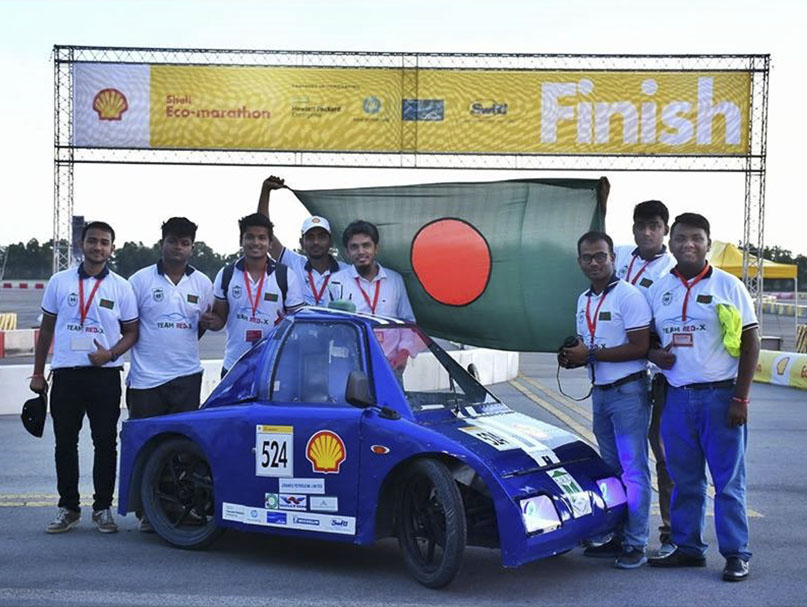
Team Robo Bot V3
After the recent collaboration between AUST Robotics Club (AUSTRC) and Engineers Vlogs, Team Robot Bot V3 from Ahsanullah University of Science and Technology (AUST) visited Nepal to participate in the prestigious Orbit Engineering Expo 2.0, representing Bangladesh on the global stage. The team has brought glory to Bangladesh by achieving the first runner-up position at the Orbit Engineering Expo 2.0, hosted by Engineers Vlogs in Nepal on December 5-7, 2024. This achievement marks a significant milestone in Bangladesh’s efforts to shine on the global stage.
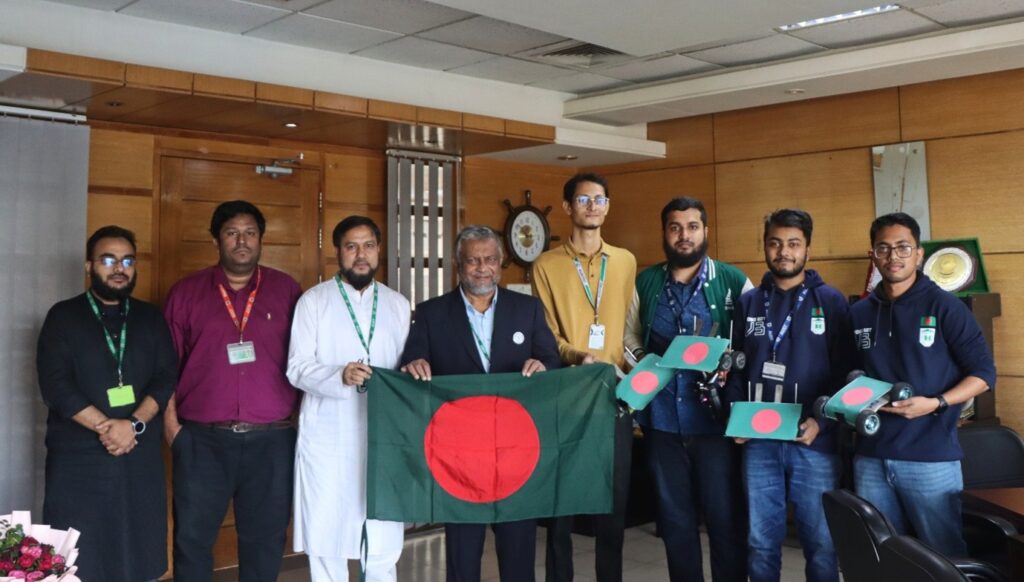
Clean Force Limited
Founded by Tashdik Habib, an Industrial & Production Engineering graduate, Clean Force Limited specializes in scientifically cleaning water tanks and pipelines. Since its inception in 2018, the company has serviced over 12,000 households and offices in Dhaka. It is recognized as Bangladesh’s first ISO 9001:2015 certified water tank and pipeline cleaning company and received the “Ecommerce Movers Award 2020” for its emergency services during the COVID-19 lockdown.
JuteX
Team JuteX, comprising AUST students, developed a bicycle frame made entirely from jute fibers. Their innovation aims to rejuvenate Bangladesh’s jute industry and promote environmental sustainability. The project won the Hult Prize Regional Championship in Vietnam in 2020 and was a finalist in the Hult Prize Global Accelerator Round.
SOYNIC
SOYNIC, a startup idea presented by Team GAMBIT from AUST, focuses on providing soy-based products as a healthy and affordable alternative to meat. The team secured Top 6 finalist position in the Hult Prize Global Summit.
Beyond the Classroom: Vibrant Student Life and Extracurricular Activities
AUST believes that true education goes beyond textbooks and classrooms, playing a key role in shaping well-rounded individuals. In keeping with this belief, AUST actively supports a vibrant range of extracurricular activities through various student-run clubs and organizations. These platforms offer students valuable opportunities to explore their interests, gain practical skills, expand their social networks, and grow personally and professionally. With a wide variety of clubs catering to diverse passions—from robotics to debating, cultural expression to community service—AUST ensures every student has a chance to thrive outside the classroom.
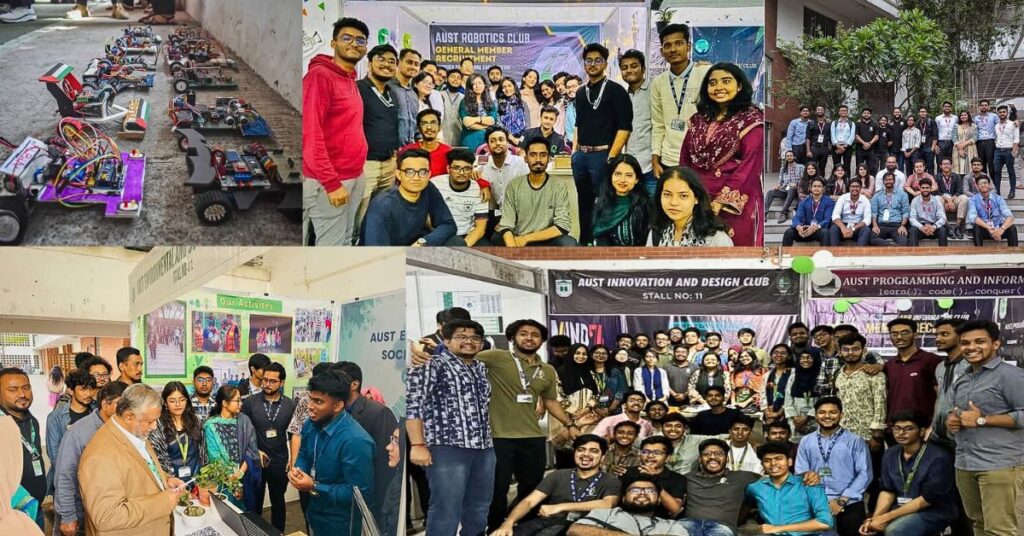
AUST Cultural Club:
AUST Cultural Club (AUSTCC) celebrates diversity and artistic expression through music, dance, drama, and cultural festivals. Students get the chance to showcase their talents while engaging with the vibrant cultural heritage of the community, creating a dynamic and inclusive environment.
AUST Sports Clubs:
AUST Sports Club promotes health, fitness, and teamwork through both indoor and outdoor sports. Students can participate in cricket, football, basketball, badminton, and table tennis, as well as inter-departmental and inter-university tournaments that encourage sportsmanship and school spirit.
AUST Robotics Club (RC) :
AUSTRC promotes innovation in robotics, engaging students in projects related to AI, autonomous robots, and microcontroller-based designs. It offers hands-on opportunities to explore the latest advancements in robotics technology.
Career Development Club (CDC):
CDC organizes workshops, seminars, and career-focused events to enhance employability skills and prepare students for their professional journeys. It also offers guidance on higher education options and career development strategies.
Innovation and Design Club (IDC):
IDC fosters creativity and entrepreneurial thinking by encouraging students to work on real-world design challenges and innovative tech projects. It provides a platform for developing business ideas and design solutions.
Debating and Public Speaking Club:
Debating and Public Speaking Clubs instill critical thinking, argument, as well as public speaking skills in students by exposing them to debating, extempore talks, and public speech workshops. These prepare the students to communicate better with clarity of thought and to engage more actively in healthy discussions.
These extracurricular activities are central to developing an active university lifestyle. students can gain leadership skills, team-working skills, planning skills, and people skills – skills that employers recognize and essential to success both personally and professionally. Being involved with these activities also gives students the opportunity to develop lifelong friendships, increase social networks, and develop feelings of belonging to university. AUST proactively develops and encourages these student connections and student associations, recognizing the potential to provide depth to the student experience.
Notable International Research Projects and Publications
AUST is actively involved in various research projects, some of which include:
- SUSLEATHER Project: A collaboration among Bangladeshi, Danish, and Italian researchers, focusing on sustainable practices in the leather industry.
- NIPOSH Project: A joint initiative with the University of Southern Denmark and the Bangladesh Garment Manufacturers and Exporters Association, aiming to improve occupational safety and health in the garment sector.
- Aalborg AUST Research Project (POSH): Funded by DANIDA, this project explores sustainable practices in the textile industry.
- TSUIB Project: Supported by JICA, this project focuses on upgrading the structural integrity of buildings in densely populated urban areas.
- EV Research Project: Funded by USAID, this project investigates the potential of electric vehicles in Bangladesh.
These projects reflect AUST’s commitment to addressing global challenges through research and innovation.
Funding and Collaborations
AUST has established partnerships with various international organizations to enhance its research capabilities:
GIZ: A Memorandum of Understanding was signed to extend their partnership until December 2026, focusing on digital skills development for students.
USAID: The university received a grant for research on electric vehicles under the BADGE project.
DAAD: The university collaborated with the Technical University of Dresden on sustainability initiatives in textile engineering.
These collaborations provide AUST with the resources and expertise to undertake impactful research.
Societal Impact and Contributions to Bangladesh’s Development
AUST’s contributions to Bangladesh’s development are far-reaching. The university plays a critical role in addressing the country’s need for skilled professionals in fields such as engineering, architecture, and business. AUST’s graduates are well-equipped to meet the demands of industries, both locally and globally, and many have gone on to make significant contributions to various sectors.In addition to producing skilled professionals, AUST also engages in community service and outreach programs.
These initiatives aim to tackle issues such as access to clean water, waste management, and healthcare. AUST has collaborated with local communities and NGOs to implement projects that address these challenges, contributing to the overall well-being of society.Furthermore, AUST’s focus on sustainability aligns with Bangladesh’s broader development goals. The university’s research and innovations in renewable energy, waste management, and environmental engineering play a vital role in advancing the country’s sustainable development agenda.
Conclusion
Ahsanullah University of Science and Technology (AUST) has established itself as one of the leading private universities in Bangladesh. Through its commitment to academic excellence, cutting-edge research, world-class faculty, and vibrant student life, AUST has made significant contributions to both the local and global educational landscape. The university’s focus on sustainability, innovation, and societal welfare ensures that its graduates are not only skilled professionals but also responsible leaders capable of making a positive impact on society.As Bangladesh continues to evolve, AUST will remain at the forefront of higher education, producing the next generation of leaders, innovators, and change-makers who will drive the country’s development in the 21st century.
Resource : AUST Website

